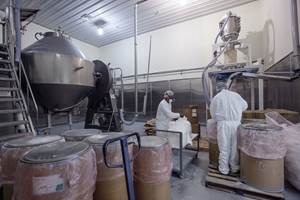All-Electric, Automated and Super-Efficient
The goal was to handle more different parts and materials and higher production volumes with fewer people and less inventory and floor space than any other plant in the company.
The goal was to handle more different parts and materials and higher production volumes with fewer people and less inventory and floor space than any other plant in the company. That was a tall order for designers of Plant 47 for Delphi Connection Systems, part of Delphi Corp.’s Packard Electric operations. The plant had to exceed the record of Delphi’s award-winning showplace plant in Cortland, Ohio.
The result: another trend-setting facility that more than meets the challenge. Delphi’s brand-new, $58-million, 190,000-sq-ft plant in Vienna Township, Ohio, produces almost 400 different parts for more than 100 customers, using 23 resin families and around 90 different compounds in 120 injection presses tended by only eight operators per shift. The highly automated, fully networked plant is yielding 15% higher throughput than Cortland (which has the same number of machines) with less than 1-ppm defects and 100% on-time deliveries.
Going all-electric
The new plant operates 24/7 to produce up to 1.4 billion parts a year—automotive connector housings, clips, clamps, and related components. These are made on 120 Fanuc Roboshot Si-B all-electric presses (plus four more in a lab area) supplied by Milacron, Inc., Batavia, Ohio. Milacron sources say this probably makes Plant 47 the largest all-electric molding plant in the world. It is also Delphi’s very first purchase of all-electric presses. Delphi evaluated different styles of machines and chose the electrics because of their energy efficiency and impressive production repeatability. Delphi felt the latter quality was particularly suited to its complex parts, which can have wall thicknesses under 1 mm together with large external features.
While electric machines can be pricey, Delphi says they actually lowered overall capital-investment needs at Vienna by more than $1.7 million in reduced machine cooling needs and other contributions to downsized utility infrastructure. Also, these machines pay off in energy savings of 11.5 million kwh/yr and eliminating the costs of hydraulic fluid, hydraulic-system maintenance, storing the fluid, and cleaning up potential spills.
Each machine is modified for Delphi with an interface to the auxiliary equipment in the manufacturing cell, an Ethernet hub, and special controls that are compatible with the plant-wide GE Fanuc Cimplicity manufacturing system, which ties virtually every piece of equipment in the plant to one control room. Each cell has a press-side granulator with sensors to detect the presence of material that needs to be ground, plus vacuum take-away of regrind to bins for reuse. The cell also has a barcode printer to produce labels for each container of finished parts, and the cell sends a signal for an automated guided vehicle (AGV) to pick up the parts and deliver them to the packaging and shipping areas.
Resin-handling showpiece
Delphi installed one of the largest and most sophisticated material handling systems in the U.S. The centrally controlled drying, blending, and conveying system was supplied by Baltimore based Novatec Inc. The system “talks” to the other systems within the facility via an Ethernet connection. “The level of integration Delphi wanted exceeded anything we’ve done in the past,” says a Novatec source. The system handles up to 32 materials simultaneously that can have different drying times and temperatures. System controls are designed to positively identify each material being used and ensure it is delivered to the proper location. Cross-contamination of materials is prevented through the use of a barcode matching system for the material, machine, and mold, and an automatic material selection system that downloads recipes to the presses.
Related Content
Technology Aims to Smarten Up Resin Conveying
At NPE2024, Novatec moves to rewrite the rules for material conveying with patent-pending smart-pump technology.
Read MoreDeflection Elbows Eliminate Streamers for Large Film Processor
New elbows eliminate troublesome streamers to increase productivity at leading blown film processor.
Read MoreCut Loading Time Through Direct Charge Blending
Direct charge blender loading, a vacuum-powered automation process, can dramatically improve loading time and reduce material costs. In this article, we address ten common questions to help you determine if the systems are right for your facility.
Read MoreConair: Going All In on AI
Conveying with Optimizer, Conair’s new AI-based conveying technology stands to be a true game changer for plastics processors.
Read MoreRead Next
Making the Circular Economy a Reality
Driven by brand owner demands and new worldwide legislation, the entire supply chain is working toward the shift to circularity, with some evidence the circular economy has already begun.
Read MoreBeyond Prototypes: 8 Ways the Plastics Industry Is Using 3D Printing
Plastics processors are finding applications for 3D printing around the plant and across the supply chain. Here are 8 examples to look for at NPE2024.
Read More



















